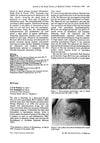 17 citations,
August 2001 in “Australasian journal of dermatology”
17 citations,
August 2001 in “Australasian journal of dermatology” A woman's liver problems improved after she stopped taking spironolactone.
8 citations,
February 2022 in “Frontiers in Medicine” COVID-19 may trigger severe skin flare-ups in people with autoimmune conditions like lupus.
 4 citations,
May 2022 in “Future Journal of Pharmaceutical Sciences”
4 citations,
May 2022 in “Future Journal of Pharmaceutical Sciences” Melatonin-loaded microemulsion could be a promising treatment for hair loss.
 2 citations,
January 2013 in “Elsevier eBooks”
2 citations,
January 2013 in “Elsevier eBooks” The document explains the genetic causes and characteristics of inherited hair disorders.
 8 citations,
April 2011 in “Surgery today”
8 citations,
April 2011 in “Surgery today” A substance called sodium zinc dihydrolipoylhistidinate can significantly reduce hair loss caused by chemotherapy in rats.
 June 2001 in “Journal of The American Academy of Dermatology”
June 2001 in “Journal of The American Academy of Dermatology” The exam tested knowledge on various skin-related topics for CME credit.
 September 1983 in “Journal of The American Academy of Dermatology”
September 1983 in “Journal of The American Academy of Dermatology” Experts discussed hair care, genetic hair defects, hair loss treatments, nail surgery, lupus treatments, skin infections, and cosmetic allergies.
 April 2017 in “Childhood Kidney Diseases”
April 2017 in “Childhood Kidney Diseases” Azathioprine can cause severe blood issues and hair loss, needing careful monitoring and possible discontinuation.
 1 citations,
November 2015 in “Journal of Evolution of Medical and Dental Sciences”
1 citations,
November 2015 in “Journal of Evolution of Medical and Dental Sciences” Certain skin symptoms can help detect and manage systemic lupus.
 July 2018 in “Elsevier eBooks”
July 2018 in “Elsevier eBooks” Lichen Planopilaris is a hair loss condition best treated early with various medications, including hydroxychloroquine, to prevent permanent baldness.
 2 citations,
October 2015 in “Primary Care: Clinics in Office Practice”
2 citations,
October 2015 in “Primary Care: Clinics in Office Practice” Doctors should diagnose hair loss by examining the patient and possibly doing tests, and then treat it based on the type, which may prevent permanent hair loss.

Chemotherapy can cause skin issues and hair loss, and this guide explains how to manage them.
 August 2016 in “Journal of Dermatology”
August 2016 in “Journal of Dermatology” A chemical called 5-Bromo-2′-deoxyuridine caused rapid hair loss in mice by killing certain skin cells through a specific cell death pathway.
 March 2018 in “International journal of basic and clinical pharmacology”
March 2018 in “International journal of basic and clinical pharmacology” Carboplatin-paclitaxel is preferred for advanced lung cancer due to its balance of affordability and patient well-being.
 November 2024 in “Journal of Clinical Medicine”
November 2024 in “Journal of Clinical Medicine” The treatment improved hair thickness, shine, and reduced hair loss effectively.
 November 2024 in “Applied Sciences”
November 2024 in “Applied Sciences” Wild strawberry waste extract can be a sustainable cosmetic ingredient for treating acne and hair loss.
 April 2024 in “JEADV. Journal of the European Academy of Dermatology and Venereology/Journal of the European Academy of Dermatology and Venereology”
April 2024 in “JEADV. Journal of the European Academy of Dermatology and Venereology/Journal of the European Academy of Dermatology and Venereology” Retinoic acid helps activate hair growth in people with common hair loss by working on a specific cell growth pathway.
 4 citations,
January 2021 in “Postępy Dermatologii i Alergologii”
4 citations,
January 2021 in “Postępy Dermatologii i Alergologii” Hydroxychloroquine can help treat certain types of hair loss.
 59 citations,
May 2014 in “Expert Opinion on Therapeutic Targets”
59 citations,
May 2014 in “Expert Opinion on Therapeutic Targets” The document concludes that targeting 5α-reductase, the androgen receptor, and hair growth genes, along with using compounds with anti-androgenic properties, could lead to more effective hair loss treatments.
 2 citations,
February 1981 in “Journal of the Royal Society of Medicine”
2 citations,
February 1981 in “Journal of the Royal Society of Medicine” A three-year-old girl survived a rare serious infection caused by BCG vaccination, which improved after treatment with a leprosy drug.
 June 2024 in “Journal of Education, Health and Sport”
June 2024 in “Journal of Education, Health and Sport” Androgenetic alopecia can be treated with minoxidil and finasteride, requiring long-term use and patient cooperation.
 November 2024 in “Clinical Cosmetic and Investigational Dermatology”
November 2024 in “Clinical Cosmetic and Investigational Dermatology” Rosemary oil may effectively treat hair loss with fewer side effects, but more research is needed.
 8 citations,
August 2018 in “International Journal of Dermatology”
8 citations,
August 2018 in “International Journal of Dermatology” The document concludes that doctors should carefully consider off-label drug use in dermatology and always inform patients, while more research is needed on the safety and effectiveness of such practices.
 22 citations,
January 2018 in “Experimental Dermatology”
22 citations,
January 2018 in “Experimental Dermatology” The meeting focused on understanding, diagnosing, and finding treatments for irreversible hair loss diseases.
 2 citations,
January 2023 in “BioMed Research International”
2 citations,
January 2023 in “BioMed Research International” The secretome from mesenchymal stromal cells shows promise for improving facial nerve injury treatment.
 1 citations,
January 2017 in “Springer eBooks”
1 citations,
January 2017 in “Springer eBooks” Understanding the immune-related causes of Alopecia Areata has led to potential treatments like JAK inhibitors.
 5 citations,
March 2015 in “Clinical and Experimental Dermatology”
5 citations,
March 2015 in “Clinical and Experimental Dermatology” Chemotherapy caused a woman's permanent hair loss and early menopause.
 6 citations,
May 2020 in “JAMA Ophthalmology”
6 citations,
May 2020 in “JAMA Ophthalmology” Using 5-alpha-reductase inhibitors, drugs for prostate issues and hair loss, may lead to eye abnormalities in men.
 89 citations,
September 2010 in “Annual Review of Genomics and Human Genetics”
89 citations,
September 2010 in “Annual Review of Genomics and Human Genetics” The document concludes that understanding the genes and pathways involved in hair growth is crucial for developing treatments for hair diseases.
 50 citations,
February 2018 in “Biomedicine & pharmacotherapy”
50 citations,
February 2018 in “Biomedicine & pharmacotherapy” Ginseng may help treat cancer and reduce treatment side effects, but more research is needed.





























